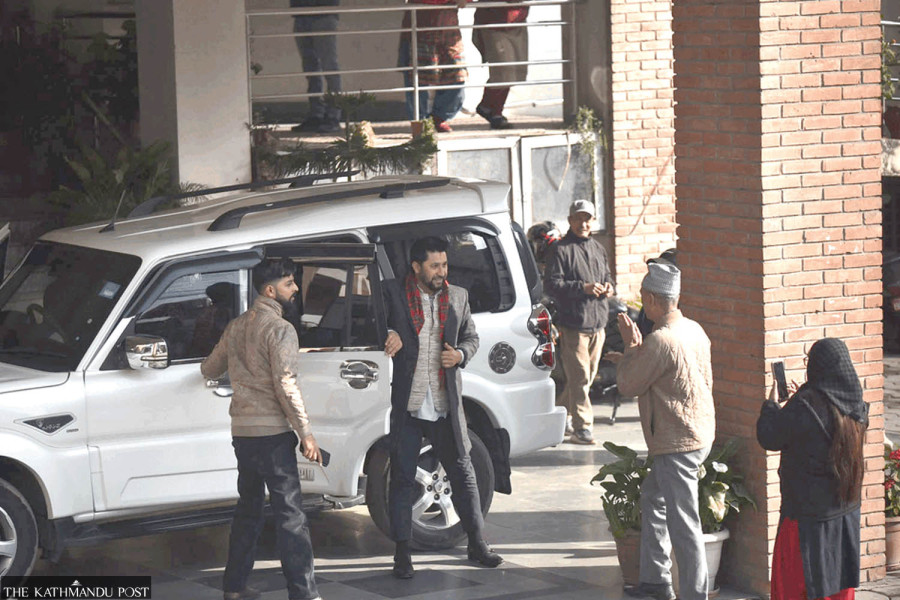National
Three days after Kaski bail, Rastriya Swatantra Party chief Lamichhane lands in Kathmandu police custody
He will be in police custody until the Kathmandu District Court decides whether to free him on bail or send him to judicial custody.
Post Report
Three days after the Kaski district court freed Rabi Lamichhane, former home minister and president of the Rastriya Swatantra Party, on Rs6.5 million bail, the Kathmandu District Court on Sunday sent him to judicial custody.
Lamichhane was released from the Kaski police’s custody on Thursday evening after posting the bail in a case of fraud involving the Pokhara-based Suryadarshan Cooperative.
On Sunday, Lamichhane appeared at the Kathmandu District Court to record his statement regarding the Kathmandu-based Swarnalaxmi Cooperative case, wherein he and a few others are accused of misappropriating the cooperative's funds.
After registering Lamichhane's statement in the Swarnalaxmi Cooperative funds embezzlement case, Kathmandu District Court Judge Madhav Prasad Adhikari ordered Lamichhane to be handed over to the police stating that the pre-trial remand hearing was not over.
“Though the recording of Lamichhane’s statement has been completed, due to time constraints, the remand hearing could not start on Sunday,” Amar Bahadur Chand, information officer at the Kathmandu court, told the Post. “Therefore, the court decided to hand him over to the District Police Range, Kathmandu.”
After the prosecutor and the defendant’s lawyers met to discuss the hearing, Chand said the remand hearing would start on Monday. Chand said that at least 10 lawyers have enlisted to plead for Lamichhane.
In the remand hearing, the Kathmandu district attorney will first make their case against Lamichhane. Later, Lamichhane's lawyers will defend the charges levelled against him. If needed, prosecutors can also argue after the defending lawyers’ argument before the court's verdict.
Chand said the Kathmandu District Court’s procedures will be similar to those of the Kaski District Court.
Lamichhane will be in police custody until the Kathmandu District Court decides whether to free him on bail or send him to judicial custody until the final verdict.
Lamichhane’s legal adviser, Yagyamani Neupane, said that an appeal to conduct the remand hearing on Sunday was denied due to time constraints.
“Although we proposed conducting the hearing, the judge cited a lack of time and ordered police custody instead,” Neupane said.
Police investigations have shown that Rs57.898 million was illegally transferred from Swarnalaxmi to Gorkha Media Network, where Lamichhane was the managing director before joining politics in 2022. The government attorney's office filed a case against Lamichhane, claiming the amount was embezzled in his involvement.
Lamichhane was released on bail by the Kaski District Court on Thursday after spending 84 days in custody only to appear before the Kathmandu District Court. The court released Lamichhane and former deputy inspector general (DIG), Chhabilal Joshi, also the founder of Gorkha Media Network, after Prabhu Bank officials provided surety bonds.
On January 5, the Kathmandu District Attorney’s Office filed formal charges against Lamichhane and 39 others, including former Gorkha Media Network chair Gitendra Babu (GB) Rai and Joshi. While Rai has been on the run, police have investigated Lamichhane, Joshi, and a few other accused in connection with rerouting the cooperatives’ money to the Gorkha Media Network.
The charges allege large-scale financial mismanagement and embezzlement of Swarnalaxmi Cooperative. They range from cooperative fraud to organised financial crimes. The police investigation suggests that funds were systematically mismanaged and diverted, affecting thousands of cooperative depositors.
The case against Lamichhane and others is not limited to the Swarnalaxmi Cooperative alone. Police investigations have expanded to include cooperatives in other districts, including Rupandehi, Chitwan, and Parsa. The focus of these investigations is on the systematic embezzlement of funds, which, according to authorities, were misused in a coordinated effort across multiple cooperatives.




 11.42°C Kathmandu
11.42°C Kathmandu













